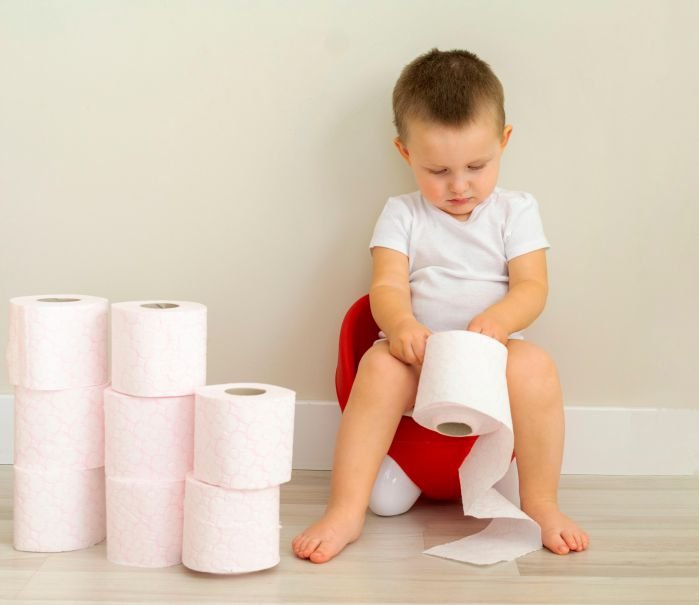Diarrhea is a common condition that affects many children at some point. It typically causes loose, watery stools and an urgent need to use the bathroom. While diarrhea often resolves on its own, it’s important to understand the causes, signs, treatment options, and proper care. This guide will cover everything parents need to know about managing diarrhea in children.

Causes of Diarrhea in Children
There are several potential causes of diarrhea in children, including:
- Viruses: Rotavirus is a leading cause worldwide and often goes around childcare centers/schools. Adenovirus, norovirus, and other viruses may also be to blame.
- Bacteria: Common bacterial causes include E. coli, Salmonella, Campylobacter, Shigella, and Clostridium difficile. Most food/waterborne illnesses arise from bacteria.
- Parasites: Giardia, Cryptosporidium, and other parasites inhabiting contaminated food/water can trigger outbreaks.
- Medications: Antibiotics are a frequent culprit by disrupting gut bacteria balance. Other drugs like laxatives may cause diarrhea.
- Dietary factors: Allergies, lactose intolerance, eating too many sugary treats, or going too long between meals.
- Medical conditions: Inflammatory bowel disease, celiac disease, and intestinal illnesses could underlie chronic cases.
Symptoms of Diarrhea in Children
The hallmark signs of diarrhea include:
- Loose, watery bowel movements that take the shape of the toilet bowl.
- Increased trips to the bathroom – sometimes urgently.
- Soft, mushy, or liquid stool compared to solid waste.
- Abdominal cramps or pain, especially during or after bowel movements.
- Loss of appetite or unwillingness to eat preferred foods.
- Fever or vomiting alongside acute diarrhea resulting from infections.
Treatment for Diarrhea in Children
Mild diarrhea cases typically clear up within a few days without treatment once the underlying trigger resolves. However, certain measures can provide relief and prevent dehydration including:
- Oral rehydration therapy with pediatric oral rehydration solution (ORS).
- Temporary clear liquid diet of broth, sports drinks, electrolyte beverages, ice pops.
- Probiotics like yogurt to restore healthy gut bacteria faster.
- OTC anti-diarrheal medications only after consulting a pediatrician.
- Antibiotics if diarrhea results from a bacterial infection as prescribed.
- Zinc supplementation short-term shown to shorten duration of infectious diarrhea.
Prevention of Diarrhea in Children
To help prevent diarrhea from arising:
- Practice safe handwashing, especially before eating and after using the bathroom.
- Properly wash and cook all foods, especially meats and eggs.
- Avoid raw/undercooked foods or anything left outside unsafe temperature danger zone.
- Drink only pasteurized milk, juices, and water from trusted sources.
- Maintain hygiene of high chairs, toys, doorknobs, etc. that children commonly put in their mouth.
- Vaccinate against diarrheal illnesses like rotavirus on schedule.
- Avoid swimming when diarrhea present to prevent fecal contamination of pools.
Complications of Diarrhea in Children
While generally mild and self-limiting, prolonged or severe diarrhea carries risks such as:
- Dehydration from fluid loss if ORS intake does not match losses. Signs include sunken eyes/fontanels, skin that tents when pinched, lack of tears/urine.
- Malnutrition, especially in developing nations, if diarrhea durations stretch longer than 2 weeks.
- Hemolytic uremic syndrome, a type of kidney failure, from some bacterial infections like E. coli.
- Seizures in extreme cases where electrolyte imbalances drastically affect nerve cell function.
When to Seek Medical Help for Diarrhea in Children
See a pediatrician if the child experiences:
- Diarrhea over 48 hours without improvement or gets worse.
- Diarrhea with fever over 101°F, abdominal pain, or blood in the stool.
- Inability to keep down any fluids for over 6 hours.
- Dehydration signs like little or no urination for 8-12 hours, dry mouth, no tears, lethargy.
- Underlying health issues like immune impairment or chronic digestive diseases.
- Bloody, mucus-filled, or black tarry stools.
- Diarrhea lasting over 14 days or accompanied by failure to thrive.
Proper evaluation can identify the true cause and guide appropriate treatment if home remedies fall short.
Home Remedies for Diarrhea in Children
First line at-home care includes:
- Oral rehydration solutions (ORS): Pedialyte, Ceralyte, Enfalyte and store brands contain optimal sodium, potassium and glucose levels for rehydration.
- Clear liquids diet: Restrict to water, apple juice, broth, gelatin for 12-24 hours until stools firm up.
- Probiotics: Live culture yogurt 1-2x daily aids recovery of healthy gut flora.
- Rice water: Boiled white rice made into a thin porridge binds loose stools when introduced slowly.
- Bananas: Their pectin acts as a bulking agent for firmer bowel movements.
- Bone broth: Sip warm broth for electrolytes and natural soothing properties.
- Pedialyte popsicles: Freeze diluted pedialyte to encourage fluid intake.
- Warm baths: Offer comfort and relaxation during bouts of cramping or soft stools.
Dietary Recommendments for Children with Diarrhea
During acute diarrhea and initial recovery phase:
- Offer clear liquids diet for 12-24 hours – water, Pedialyte, broth, jello, popsicles.
- Slow reintroduction of foods in BRAT order – Bananas, Rice, Applesauce, Toast.
- Avoid cow’s milk, high fiber, fatty, spicy, gassy foods that may worsen symptoms.
- Promote hydration with fluids every 15-20 minutes while awake, including oral rehydration solutions.
- Once diarrhea resolves, restore a balanced, nutritious diet rich in probiotic foods.
With proper care, most pediatric diarrhea clears up quickly. Consulting a pediatrician ensures appropriate management of any concerning signs or prolonged cases. Following dietary and home remedies guides, in combination with oral rehydration and rest, support recovery.










Discussion about this post